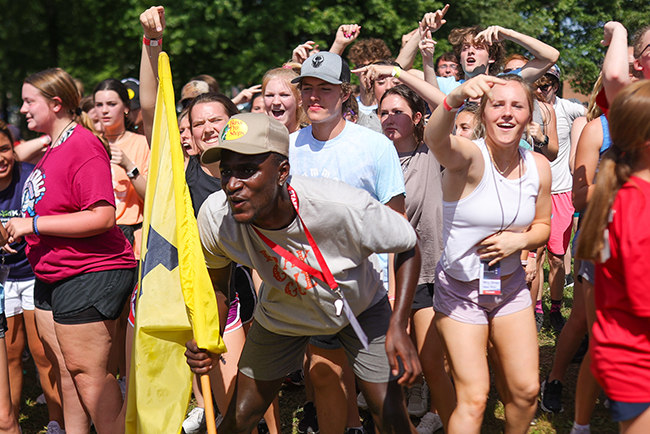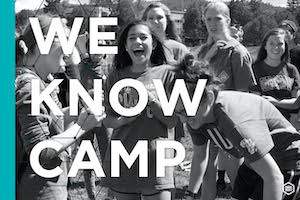
Summer camps aren’t the only ministry training ground, but for these former staffers, they were intensives that propelled them into ministry.
By Marissa Postell Sullivan
It was 1994. He had just completed his freshman year of college and was diving into his first of what would be three summers working on the FUGE Camps staff.
Serving on the recreational staff for two summers and as a Bible study leader one summer, Chad Keck’s work at camps laid the foundation for learning to lead people and navigate teaching dynamics in a group.
“There’s nothing like having 25 seventh and eighth graders you are trying to teach,” Keck reminisces.
As he engaged in ministry, Keck was introduced to the difficulties of ministry. He learned the importance of student ministers and adult leaders and developed the ability to stick to a schedule while being willing to adapt to the work of the Holy Spirit. And all the while, he was learning to work alongside a ministry team filled with different personalities, giftings, backgrounds, and needs.
Now, nearly 30 years later, Keck utilizes these skills he began honing at camp in his role as the senior pastor of First Baptist Church Kettering, Ohio. While camps weren’t his only training ground for ministry, his summers at camps were intensives that prepared and propelled him into ministry.
“You would be hard-pressed to learn as much as fast as you can in eight weeks at camp,” Keck says.
“You would be hard-pressed to learn as much as fast as you can in eight weeks at camp.” — @keck75 Click To TweetAs a pastor, Keck has spent over ten years building a church and student ministry DNA of sending students to work in summer camp roles and other similar opportunities as they focus on cultivating saints who are equipped for the work of ministry.
Called to ministry
Even now college students in your congregation are making their plans for the summer. Maybe they feel called to ministry leadership. Maybe they don’t. Either way, how they spend their college summer months will shape them.
Ashley Brewer grew up as a pastor’s kid but never considered ministry as a career for herself until she worked at camp.
“Getting to teach on how to do children’s ministry, lead churches in their missions experiences, and be around others my age who were working toward doing ministry opened my heart to the idea of going into ministry vocationally myself,” says Brewer, bi-vocational children’s minister and church success specialist at Lifeway.
Because of working at camps, Brewer stepped into her first full-time children’s ministry role with practical ministry tools in her toolbelt.
“Practical methods for leading a ministry come with practice, but you can’t really learn them in a classroom,” Brewer says. “I feel like I already had this experience going into my first ministry job, even though I’d never worked on a church staff before.”
Practical training (for any vocation)
Other former camp staff point to additional skills they developed that have applications for all of life and work—not just ministry. Amber Vaden, Lifeway team leader with Explore the Bible, says she learned not only the value of working together as a team but also how to be a helpful teammate. Vaden gives camps credit for giving her confidence to handle unusual issues that pop up.
Danielle and Wes Sullivan, a couple who both worked multiple summers on Student Life Camp teams, also pointed to camps as helping them navigate team dynamics. At camps, the Sullivans say they learned how to work with other staff. In particular, they learned how to lead others, even those who were older than them or had more experience than them. And in leading others, they learned humility and how to have a teachable heart. Additionally, camps helped make the Sullivans aware of people in a variety of life situations and grew their ability and willingness to work alongside people with various preferences and personalities.
Training for ministry in “unofficial” capacities
While it’s common for a pastor or other church staff member to receive formal education for their role, many lay leaders in the church have not had this experience. But for people like Amy Cato, who faithfully serve the church without the full-time staff title, camps can be instrumental in preparing them for leadership.
“Working Lifeway camps in my early 20s made me a more confident and, hopefully, competent church volunteer,” says Cato, current CentriKid event coordinator. “Camp transformed my life and ministry and, therefore, kept me faithfully involved and serving in church.”
“Camp transformed my life and ministry and, therefore, kept me faithfully involved and serving in church.” — Amy Cato Click To TweetStudents working camps spend their summer focused on Bible study and spiritual conversations, and they leave equipped to continue implementing those skills outside of the camp setting.
“The experience of teaching day after day, week after week gave me a passion for the Word and for helping others understand it,” described Tessa Morrell, former Lifeway camps staffer and current content and production editor for Lifeway Women.
Vaden says the non-stop nature of camp gave her “lots of experiences talking about the gospel and following Jesus in one-on-one conversation.”
Brewer agreed, saying she still uses tools she learned at camp to have gospel conversations. And now she trains the volunteers in her children’s ministry to do the same. The Sullivans describe it like a mission trip that cultivates boldness in sharing the gospel. “You have limited time, and every moment is important,” they say.
Spiritual development
While camp staffers undoubtedly point to a list of practical things they learned while working at camp, they speak most fondly of the spiritual development that took place in their own lives during their summers at camp.
Brewer credits camps for growing her spiritual life—during her time as a camper, staffer, and chaperone. And Vaden says working at camps taught her the importance of her own spiritual life. More specifically, Morrell says being a camp staffer grew her trust in God.
“One of the greatest things it taught me was to rely fully on the Lord,” Morrell says. “Serving at camp can be exhausting, but you learn to trust that He will equip you with everything you need for every moment.”
Landon Tucker, former CentriKid staffer who now serves as Lifeway’s content editor for Bible Studies for Life Kids, echoed Morrell’s sentiment.
“Serving at camps shows what the end of your rope looks like and teaches you that only Jesus can help you push through whatever you’re battling mentally, physically, emotionally, and so much more,” says Tucker, who was in full-time kids ministry for nearly a decade before coming to Lifeway full-time. “In local church ministry, I’ve been at the end of my rope in many trials. And much like camp ministry experiences, I’ve been pushed again to know He is my only safe place to lean on.”
“Serving at camps shows what the end of your rope looks like and teaches you that only Jesus can help you push through whatever you're battling mentally, physically, emotionally, and so much more.” — Landon Tucker Click To TweetShaping hearts for ministry
Noah Greene, pastor of students and missions at First Baptist New Orleans, describes his experience working through three summers of FUGE Camps as one that impacts his life and ministry in ways he continues to realize today. Greene was confident God was calling him to work for FUGE Camps during his college summers. And now, he says he can see how God was using that season to not only teach him but prepare and lead him to his current season of life and ministry.
“Camp taught me the value of servanthood in the Christian walk,” Greene explains. “At camp, staffers are constantly giving of themselves to serve churches, individual campers, and their staff. Every waking moment is spent serving others, pointing others to God’s Word, and having the time of your life.”
In this highly intentional environment of constantly looking for ways to serve others, staffers get real-time experience practicing servanthood alongside self-care. “Staffers have to learn themselves to know how to care for themselves—physically and spiritually—in order to give their best to others.”
As Greene developed a heart of servanthood at camp, he also developed a heart for seeing the students around him come to a saving faith in Christ.
“Camp taught me to long for the salvation of others. It taught me by experience the meaning of 1 Timothy 4:10,” Greene says. “I learned what it meant to labor and strive for the sake of the gospel in campers and in the city where we did camp. The laboring and striving were in the prayers we voiced that God would change the lives of students for His glory.”
He didn’t know it at the time, but when Greene was obedient to God’s calling to work at FUGE Camps—for one summer, then another, then another—God was doing something that would stretch far beyond those three summers.
“The principles [I learned working at camps] have led and sustained me in my current ministry position,” Greene says.
Now a part of sending students from his church to work at camps, Greene says their role as a sending church is rooted in prayer—prayers that God would work through them to reach kids and students with the gospel and prayers that God would work in them to shape their hearts and prepare them for faithfulness in any ministry context.
For permission to republish this article, contact Marissa Postell Sullivan.













